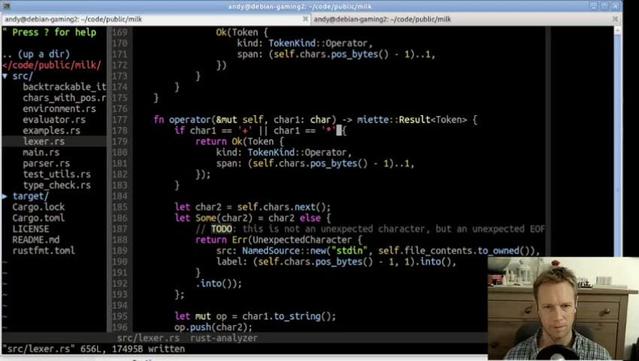Andwering my own question. Damn, it's too clever
#programminglanguages
How good are LLMs at explaining code without relying on names/keywords for hints.
If I systematically alpha-vary every identifier to something unhelpful like a01234 etc and replace all the keywords like 'if', 'match', 'use' etc by 'frob', 'garp', 'smeg' and then ask the LLM to explain what the code in a particular function is doing, will it be able to figure it out by structure alone?
Same question, but instead of a programming language, it's a Rocq proof
We're writing a mini version of Rust, in Rust! Just chugging through some tidy-ups in this video:
Sometimes I wonder if having really good sting interpolation is not a good idea in programming languages, because then people tend to cobble specially formatted strings instead of learning proper APIs to construct them.
When I first got truly comfortable with TypeScript, there was no turning back. It quickly became such a crucial part of my workflow that now, whenever I'm stuck using plain JavaScript, there's always that nagging worry—did I overlook something important? TypeScript offers a level...
#Development #advancedcode #advanceddevelopers #bitstips #code #programming #programminglanguages #typescript
https://bitskingdom.com/?p=22805

It turns out that sum types/discriminated unions were already invented in 1966 by Tony Hoare. We could have them all along if Bjarne Stroustrup decided to include it in C++, but he didn't to encourage use of virtual functions.
I'm posting this mostly for my own benefit; this is discussing a language feature I'm unfamiliar with.
What I find interesting is that just like some ideas are in the air and find their landing point, so too do some ideas just fail to find the right implementation.
So time to look up sum types (or disjoint unions or...).
"...language features are easily broken, mis-copied, forgotten or intentionally omitted due to the designer's pet beliefs."
Best keywords to use for case-matching syntax? #ProgrammingLanguages
Today I realized #Go and #Rust both have panics instead of exceptions and both originate from the second half of the 2000s.
These facts are now mentioned in https://gato-lang.dev/
If you have experience with Go or Rust, I'm interested in your thoughts on the lack of exceptions in these languages. It looks to me like an attempt to simplify things that eventually backfired, as evidenced for example by https://www.crowdstrike.com/en-us/blog/dealing-with-out-of-memory-conditions-in-rust/
SUS Lang: The SUS Hardware Description Language
A mix of neat and not-so-neat stuff :
“10 Features Of D That I Love”, Bradley Chatha (https://bradley.chatha.dev/blog/dlang-propaganda/features-of-d-that-i-love/).
Via HN: https://news.ycombinator.com/item?id=44445877
On Lobsters: https://lobste.rs/s/msjy28/10_features_d_i_love
New syntax just dropped in my toy programming language.
Not sure if I like it or hate it yet (especially the post-arguments form seen with the NEXT binding on the second picture), but I feels it's a lot easier to understand than the LET magic from before.
https://codeberg.org/bojidar-bg/project-world/commit/82b214e5757293fe32e0a11c03bb56820fc765d1
Даўно збіраўся пачытаць гэтую кнігу, але вось толькі зараз дабраўся. З усіх апісваных у кнізе моваў я зусім ніяк не сутыкаўся толькі з Prolog і Io, таму спадзяюся што гэтыя часткі кнгі прынамсі будуць цікавыя
I want to read a #compiler book written in the last 15 years that covers same topics as the Modern Compiler Implementation book by Appel, but uses recent terminology, tools and techniques. Any recommendations? #compilers #programminglanguages
EDIT: It seems like no such book exists. I guess I’ll have to read docs, blogs and papers along with old books to put things together myself.




